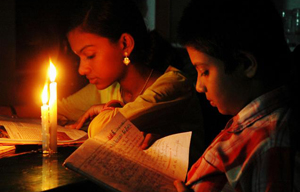Bengaluru, Aug 22: The deficient southwest monsoon has led to reduced power production forcing the Sate to resort to scheduled load-shedding in the next few days.
The State government may have directed Bengaluru Electricity Supply Company (Bescom) to ensure effective power supply till Saturday, the day of polling for the Bruhat Bengaluru Mahanagara Palike elections, but many areas of Bengaluru have been experiencing unscheduled power cuts for the past two days.
Bescom Managing Director Pankaj Kumar Pande, however, attributed them to local problems and denied that the company had resorted to load-shedding.
Kumar said the government had been drawing up a plan to conduct scheduled load-shedding, including in Bengaluru.
“Now that we have completed the process of power purchase from the open market, a plan will be chalked out for load-shedding in a day or two. It will be finalised based on the shortage and availability,” he said.
Meanwhile, escoms, including the Bescom, will spend an estimated Rs 3,400 crore to purchase power from the open market to tide over the power crisis resulting from the deficient monsoon.
They are expected to spend an estimated Rs 350 crore per month on short-term power purchases.
The Karnataka Electricity Regulatory Commission on Friday gave escoms the nod to purchase 1,000 mega watts (MW) of power at Rs 5.08 per unit till May 2016.
Currently, about 6,400 MW is available against the total requirement of 8,000 MW.
The power shortage is mainly to due to a decline in water levels of hydel reservoirs and recent outages at the Udupi Power Corporation Ltd and Ballari Thermal Power Station (BTPS).
The total capacity in the three major hydel reservoirs of Linganamakki, Mani and Supa is about 4,000 million units (MU) against 6,573 MU during the same period last year, said Additional Chief Secretary to the Energy Department P Ravi Kumar.
Due to these outages, the State is now generating hydel power at its full capacity of 40 MU, as against a normal of 12-14 MU during the monsoon season. The current storage at the reservoirs will be exhausted in about 100 days if this continues.
Of the two 500-MW BTPS units, one is under maintenance and another tripped on Thursday, said Karnataka Power Transmission Corporation Limited (KPTCL) Managing Director Jawaid Akhtar.
He added that the KPTCL had planned to procure 750 MW at Rs 5.08 per unit from this September 15 to May 2016.




Comments
Asking questions are actually good thing if you are not understanding anything totally,
however this paragraph provides pleasant understanding even.
Here is my web-site - buy followers for your instagram account (Adrian: http://igboost.net/)
Add new comment